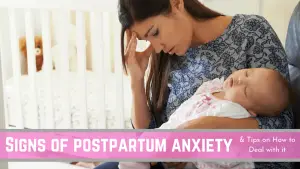Nothing really prepares you for motherhood. You can plan all you want but, at the end of the day, each child you have will change the rules of the game and throw you for an entire new loop. I say this in the most sincere and honest way possible: parenting is a complete an utter uphill battle! Don’t get me wrong, becoming a mother is also one of the most rewarding things and the best decision I have ever made in my life!
I had an uneventful birth but, what I did not know, is that after I was discharged, I would come back to the hospital the very next day for extremely high blood pressure and extreme postpartum anxiety! Yep, I said it, postpartum anxiety! I had heard about it, but never really thought it would happen to me.
I feel it is so important to share my story and to show other moms that postpartum depression or anxiety is:
- Completely normal
- More common than you think
- 100% treatable
- Something that can happen to any mom
- Something you should never go through alone!
Related:
- What to Really Expect with your Postpartum Recovery
- How to Survive the First 3 Months with a Newborn
- 6 Tips for First Time Moms
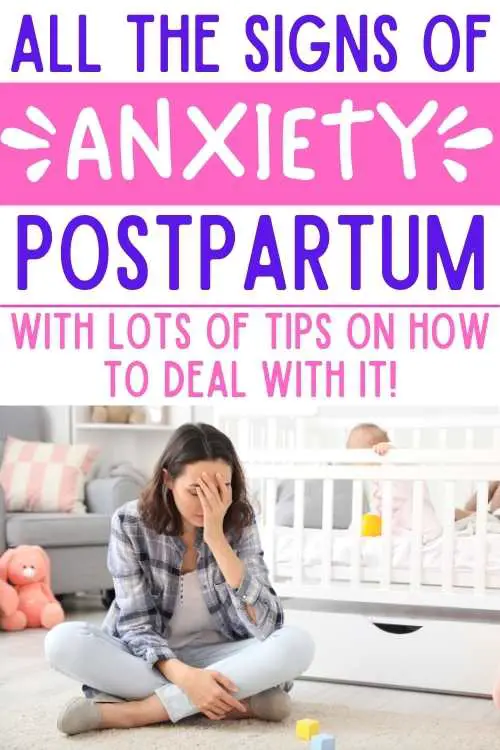
Signs of Postpartum Anxiety
Postpartum depression and anxiety are and can present different in any mom. Personally, I struggled more with postpartum anxiety as I was afraid to have even a family member hold my baby or even letting her out of my sight for a quick shower!
Still to this day, my family jokes with me that I would never share my first baby with anyone. But we can leave that story for another day!
There can be a variety of symptoms and signs of postpartum anxiety and every mom should be aware of them as they can present in so many ways and sometimes even overlap. They are as follows:
- Insomnia**
- Irritability
- Mood swings
- Loss of appetite**
- Difficulty bonding with baby
- Extreme sense of sadness or crying
- Feeling emotional numbest or withdrawn**
- Thoughts of self-harm or harming your baby
- Intrusive thoughts**
- Feelings of intense anxiety or panic attacks**
I have asterisked the ones that I presented with personally.
For example, I couldn’t sleep when my baby was sleeping. I would literally jump and shake every time she made a noise and, by the time I would start to doze off, I was right back up because it was time to nurse her again.
And, still to this day, I vividly remember the numb feeling of just nothingness and my mom asking me to explain how I felt to her. All I could say was I felt nothing. I felt absolutely nothing!
Is Postpartum Anxiety the same as the “baby blues”?
Well, not exactly. Think of the blues as a very mild emotional reaction to childbirth. Those pesky hormones are still changing, so some mood instability is still likely. You may have ups and downs or periods of time where you feel teary and sad. Even moments when you feel like you are a fraud and were not cut out for this motherhood thing. It is not to the same extent as the above list, however.
Usually, it can be a wait and see approach if these symptoms are not interfering with your sleep or daily activities. But most moms who experience the blues should start to improve just after a couple weeks.
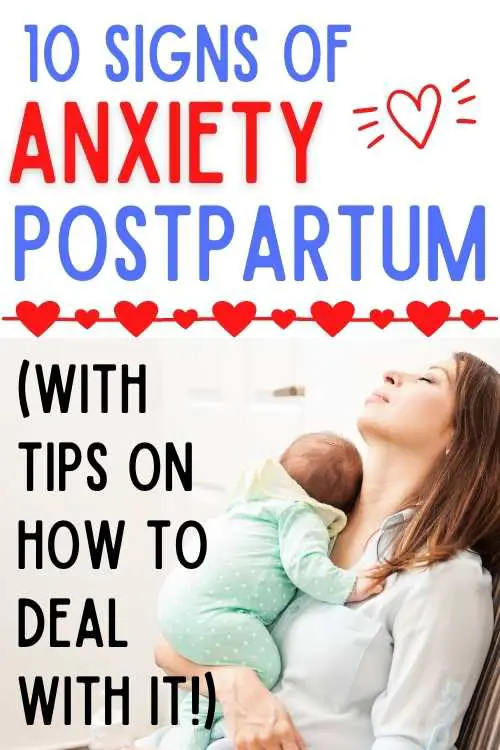
Steps to Overcome Postpartum Anxiety
If the baby blues feelings don’t go away after two weeks, or get worse, then you may be experiencing postpartum anxiety or depression. If that is the case, these the following steps will help you get on the right direction for recovery.
STEP #1: Admit to yourself that something is not right, and you need help
Don’t be afraid or embarrassed to do so. Think about this for a moment: you housed a baby inside your body for over 9 months, during which your hormones were constantly changing, affecting your mental stability. And then, you deliver that precious baby, and the flood of hormones changes drastically in an instant!
Of course, some moms may be more prone than others when it comes down to it, but the fact of the matter is, it can happen to any momma!
STEP #2: Seek help
Preferably from your OBGYN as you will be following up in their care after delivery. They see postpartum depression and anxiety often and screen for it at your 6-week follow up.
Best word of advice: don’t wait until this 6-week follow up to discuss it with your doctor. Make the appointment and go in early: you do not have to suffer and wait. And taking medication is okay too, it does not mean you have failed!
Sometimes, I feel it is just these words that a mom needs to hear: to know they are not alone and that it is okay to seek help!
STEP #3: Get a counselor ASAP
This was my bread and butter. I needed someone to listen to my irrational fears who was not a family member or my husband.
It got to a point where my husband just was not sure what to do for me anymore. So, I started taking Zoloft, seeking counseling, and working hard to set things straight.
Having an unbiased view on your personal struggles is so important. And you should feel safe with your counselor: if you do not blend well together, get a new one until you do!
For me, personally, it was important for my counselor to be a woman, who had their own children, and specialized in postpartum moms. That is where I felt the most comfortable. I needed someone to understand what it was like, and who had experienced motherhood first-hand. It made all the difference in my success!
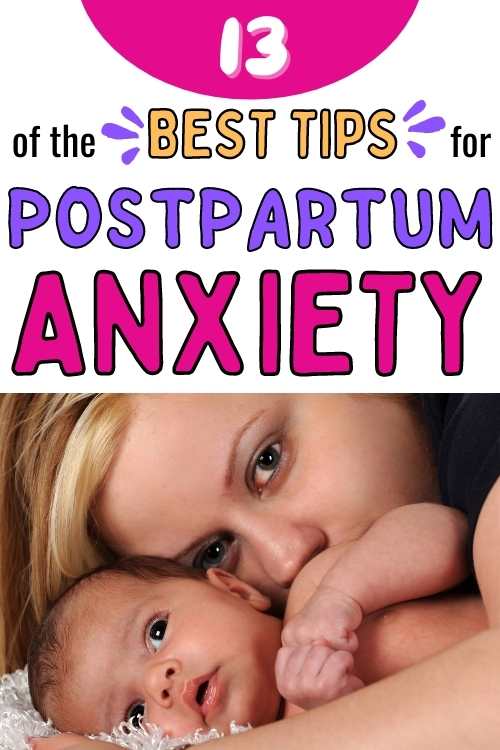
Tips on How to Deal with Postpartum Anxiety
Below are some tips on how to deal with postpartum anxiety and small steps you can take to help guide you back into normalcy again:
1) SET A NORMAL SLEEP / WAKE PATTERN
Setting a normal sleep/wake pattern is critical to getting back to normal. Getting to bed at the same time allows your body and your baby to get back on a sleep schedule. Waking up at a consistent time allows you to get into a routine so you can start your day off right.
You can also check out here some tips on how to avoid sleep deprivation when at home with a new baby. These will definitely help as well.
Related: 8 Tips for New Parents to Avoid Sleep Deprivation
2) TAKE A SHOWER EVERY DAY AND GET DRESSED
This will help get “you time” and allow you to start your day with a clean slate.
3) HAVE A LIST OF TASKS TO DO
Mom brain is a thing! Have a short list of attainable tasks to do daily to give yourself a sense of accomplishment and accountability.
4) INCORPORATE UNCOMFORTABLE ACTIVITIES IN YOUR DAY
If you are feeling uncomfortable about any particular activity, try to slowly incorporate a few minutes of that activity once a day! For example, answer an email, call a family member to talk about positive things, or go on a short walk even if you just want to lay in bed.
5) TALK ABOUT HAPPY THINGS
When talking with others, try to discuss happy things and avoid constant talk about PPD or negative things. This will help to divert your attention away from sulking thoughts.
6) LET FAMILY HELP
Keep in touch with close family members. Let them support you and listen If you need to talk!
7) FIND JOY IN A DAILY ACTIVITY
Even though it may be difficult, try to find joy in a daily activity each day. Take a walk, read a book, or sit and snuggle while watching a funny, feel-good movie. Constantly looking for joy in your life will only manifest within you and help bring you joy.
8) EAT REGULARLY
Sometimes it may help to set a timer to remind yourself when to eat, as taking care of a newborn can be time consuming and skipping meals is easy to do. This will help you feel energized and avoid being hungry while you are working on yourself.
Give your body the nourishment it needs while recovering from such a big event in your life!
9) HAVE 15 MINUTES OF WORRY A DAY
If worrying is a big issue, allow yourself 15 minutes of worry time each day! Grab a note pad, write all the worries you have or anxious thoughts down in that time frame. When your time is up, close the notepad and tell yourself you can worry about these things tomorrow. Eventually, you will see less items on your list!
10) CHALLENGE YOUR NEGATIVE THOUGHTS
If you have a negative thought – challenge it! Use your rational brain to explain to the irrational side why a particular thought is incorrect.
If you struggle with sulking or repetitive intrusive worrisome thought patterns, immediately tell yourself “no I am not going to allow this thought in”! You may have to tell yourself this over and over and over. Over time, you will find the sulking and intrusive thoughts become less prominent.
11) PRACTICE MINDFULNESS
With your full attention, focus on your current task. As you notice your brain starting to wander in thoughts, bring the attention back to the current task. The goal it to force the brain to focus on the immediate task instead of worrying about the unforeseen future.
This is always a challenging one for me!
12) PRACTICE MEDITATION
This was a big help for me. It allows you to reset and calm your brain and bring your stress and anxiety levels down.
13) BE REALISTIC AND KIND TO YOURSELF
Things may not improve for a few weeks or even longer and there is nothing wrong with you! My best advice is to treat every day as a new day and count every victory, even the small ones, as a big win!!
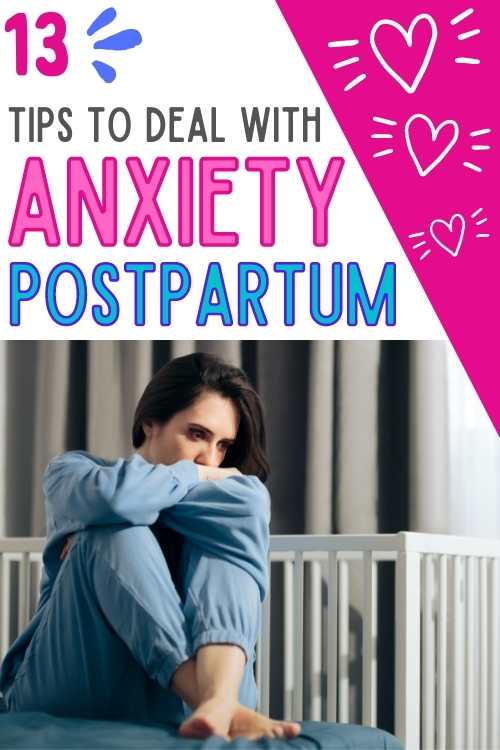
Will Postpartum Anxiety get better?
In the heat of it, I am not going to lie, it feels like you will never reach the light at the end of the tunnel. But I assure you, it WILL happen! Give yourself some grace, give yourself some time, and if I learned anything at all, it is to ask for help early on rather than later.
It hurts my heart that so many moms go through this silently, putting on a brave face and pretending everything is okay. I’ve been there…my family never even really knew how much I struggled until I recovered and was more comfortable sharing my story.
They were so sad when they learned how intense my anxiety was day in and day out! They wish they would have known and yours will too! They can’t help you, unless you let them and are open with them.
Still, to this day, I struggle with anxiety after having my first child. I still go to therapy consistently 4.5 years later, to keep up on my skills and coping techniques that I have learned.
I will always remember what my first therapist said: it’s like a game of Whac-a-mole. Anxiety will keep popping up in your life here and there and you will then, be able to use the tools you have learned to challenge those anxious thoughts and knock them back down!
Not every day is perfect, I still have good and bad days as my hormones are forever changed. But, I have more good than bad days and that is my biggest victory!
Do you need help?
If you think you are experiencing postpartum anxiety and it gets worse or your thoughts are too scary to manage, please make sure to call a mental health professional that has training in working with women that have postpartum mood disorders.
PSI (Postpartum Support International) has a great list of support groups and contacts for mental health professional all over the world, including a helpline in case of emergency.
For more tips and information on how to survive the postpartum period:
- 15 Natural Remedies for After Birth Contractions
- Postpartum Care Kit Checklist (with all Essentials!)
- What to REALLY expect with your Postpartum Recovery
- Best Postpartum Pads (for Bleeding & a Quick Recovery!)
- 8 Tips for New Parents to Avoid Sleep Deprivation
- How to Survive the First 3 Months with a Newborn
- How to Stay on Top of Chores Postpartum
Are you a mom that’s gone through and overcome postpartum anxiety and have more tips to share for other moms struggling out there? Then please feel free to comment below and share your experience 🙂
Did you find it useful? Pin It!

About The Author

Amanda is a mother to two little girls, one is 4 and the other is 18 months. She lives in Lansing, MI where after having her two little girls she knew she had to help others create heirloom artwork to remember their special moments, so she started her own Maternity and Newborn Photography business called For The Love Of Photography.

